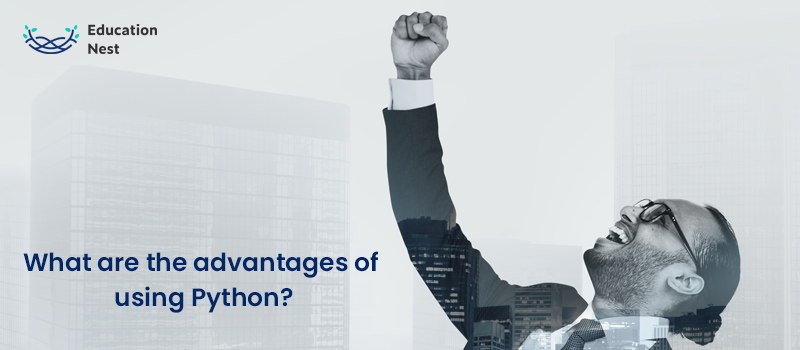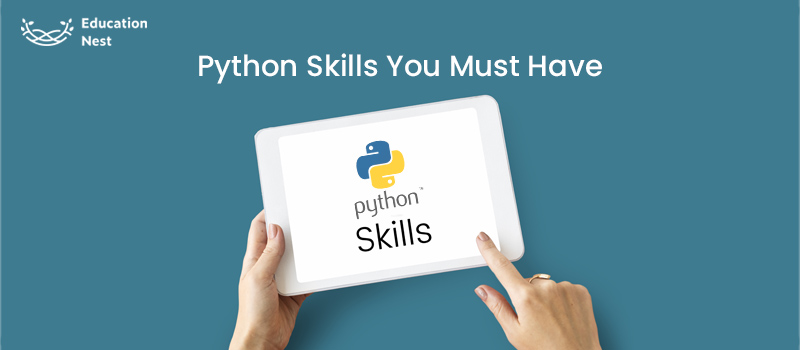Are you planning to build your career in Python? If yes, then you must know about python interview questions. These are frequently asked questions before being selected as a Python professional. This blog will help you learn Python interview questions and answers. First, let us understand what Python is.
What is Python?
Python is currently one of the most popular programming languages. It was made by Guido van Rossum and released for the first time in February 1991.
- Experts, including machine learning developers, data analysts, database administrators, and software developers, use Python’s precise and elegant syntax.
- It is a free, open-source language that enables object-oriented programming and simplifies learning.
- Python is used in several fields, including web design, GUI apps, web mining, automation, data science, and machine learning.
Python programming can accomplish several tasks with a small number of code lines. It enables complex calculations via the use of robust libraries. As a result of these circumstances, there is a rise in demand for Python-savvy workers.
This blog discusses the most frequently asked Python viva questions, which can assist you in obtaining excellent job offers.
Let’s take a look at Python Interview Questions for Freshers

Here are some Python interview questions and answers for people who are just starting out.
- What are Python’s applications?
Python is used in many different software fields, some of which are listed below:
- Internet and Web Development
- Games
- Technological and scientific applications
- Language development
- Applications for image processing and visual design
- Development of enterprise and business apps
- Operating systems
- GUI-based desktop apps
- What is Python?
Python is a high-level, object-oriented, unified-semantics programming language mostly made for building apps and websites. It is the primary language in Rapid Application Development (RAD) because of its dynamic binding and typing capabilities.
- What are the advantages of using Python?

Python has the following advantages:
- Python’s speed and efficiency improve process management and integration.
- Python has a vast standard library, including operating system interfaces, online service capabilities, string protocols and internet protocols.
- User-friendly Data Structures: Python provides an in-built library of data structures for quick data structure creation.
- Third-Party Modules: PyPI’s third-party modules allow Python to communicate with various systems and languages.
- Python’s readability and syntax make it easy to learn.
- What language type is Python? Scripting or programming?
Python is scripting-capable but is generally regarded as a general-purpose programming language.
- What is the Python namespace?
A naming scheme ensures that names are distinct to avoid naming disputes.
- Explain PYTHONPATH.
It is a setting that is used once a module is brought in. When a module is received, PYTHONPATH is examined to see if the imported modules are present in various directories. It is used by the interpreter to decide which modules to load.
Related Post: A Quick Guide for Manual Testing Interview Questions
- Is Python a case-sensitive language?
Yes, Python is a case-sensitive language.
- In Python, what is a self?
A self is an object or instance of a class. It is explicitly supplied as the first argument in Python. It’s optional in Java. It distinguishes local variable-based class methods and attributes.
In the init method, the self variable refers to the freshly formed object.
- How are comments written in Python?
Python comments begin with the # character. However, sometimes commenting is accomplished via docstrings (strings in triple quotes).
- How to make a multiple-line comment in Python?
Multiline comments are shown on many lines. Each line to be commented on must be preceded by a #. There is also a valuable shortcut for commenting on several lines. Just hold down the Ctrl key and left-click each place you want to add a # character. Then, type a # only once. It will comment on all lines where the programmer placed the cursor.
- How do you manage memory in Python?
All Python objects are stored in a remote memory region. The Python memory manager controls the heap’s sharing, buffering, segmentation, and allocation. The Python interpreter alone has access to the stack; the user does not influence it.
- What are a few built-in modules in Python?
These are Python’s built-in modules:
- OS module
- random module
- collection module
- sys module
- JSON
- Maths module
- What do you mean by Docstrings in Python?
Docstrings are documentation strings that are not truly comments. These docstrings are enclosed in triple quotation marks. They do not belong to any variable, so they can be used as comments sometimes.
- Why isn’t memory deallocated upon exiting Python?
- When Python finishes, Python modules containing looping references to other variables or global domain references are not always deallocated or removed.
- It is challenging to deallocate the memory that the C library has protected.
- Due to its efficient clean-up system, Python would attempt to deallocate and delete every other object at programme termination.
- Are access specifiers used in Python?
Python does not restrict access to instance variables and methods. Python defines the prefixing of variable, function, and method names with solo or double underscores to mimic the behaviour of restricted and hidden access specifiers.
The above Python interview questions for Freshers will help you in preparing yourself.
Apart from the python questions, there are certain things you need to master in Python.
Python Skills You Must Have

ORM Libraries:
ORM stands for Object Relationship Mapping.
- It is a method for manipulating database data using an object-oriented paradigm.
- You may learn how to use ORM libraries like SQLAlchemy and Django ORM.
- It is less complicated and quicker than writing SQL.
Frameworks:
You should begin developing a framework.
- Flask, Django, and CherryPy represent three of the most effective Python frameworks.
- Django is a robust framework that conforms to the “Don’t Repeat Yourself” (DRY)principle.
- It simplifies your job and attends to the smallest of things.
Version Control:
Multiple individuals modifying a code may ultimately compromise its security.
- To utilise version control, you must educate yourself with GitHub.
- Its vocabulary includes push, pull, commit and fork.
Front End Technologies:
To become a Python Developer, it is not necessary to master techniques and dialects such as Java, jQuery, CSS3, and HTML5.
However, if you attempt to get a fundamental grasp of them, you will learn how things operate.
As a Python Developer, you may be required to collaborate with the front-end team.
Python holds a vast scope. Furthermore, it is one of the most popular programming languages today.
Lastly, you can prepare with python viva questions and ace the interview.
